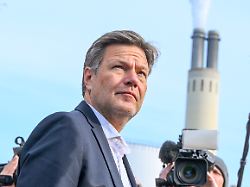Industry switching to hydrogen
Habeck launches tender for climate protection contracts
March 12, 2024, 5:38 p.m
Listen to article
This audio version was artificially generated. More info | Send feedback
The traffic light coalition wants to support companies that make their production climate-friendly. A total of 50 billion euros is intended to prevent the exodus of industry and massively reduce CO2 emissions. Business associations and Greenpeace cautiously praise the project.
With the first round of tenders for so-called climate protection contracts, the federal government has launched the core element for the climate-friendly conversion of the steel, chemical and paper industries. Companies in the basic materials industry are to be supported with up to four billion euros in order to focus primarily on climate-friendly hydrogen. “Today is a good day for Germany as an industrial location, for climate protection and for sustainable jobs in our country,” announced Economics Minister Robert Habeck.
The aim is to keep these companies in Germany despite the climate requirements. Companies in the basic materials industry can receive financial aid of up to one billion euros under the contracts, provided they apply for funding with a term of 15 years. Whoever demands the least help with the greatest possible climate impact will be awarded the contract. However, if conventional production becomes more expensive than green production over the course of the contract, for example due to rising prices for CO2 emissions, the contract is reversed. The companies then have to pay the difference back to the state for at least three years.
Reduce CO2 emissions and prevent migration
The federal government wants to start a round of tenders this year, which could mean that the subsidy volume could amount to a double-digit billion sum. One of the four planned rounds will then also focus on small and medium-sized businesses.
The total cost of the subsidies, which will run for 15 years, would ultimately amount to around 50 billion euros, explained Habeck. From his point of view, the funds are being used well because the core question is: “Is it worth it for us to have green industry in Germany?” The aim is to prevent companies in the basic industry from migrating to other countries with lower climate standards.
Overall, CO2 emissions of 350 million tons are to be avoided over the duration of the funding programs until 2045. That is almost half of the current annual emissions in Germany and a third of the emissions cuts required by the entire industry by 2030.
Cautious praise from business and Greenpeace
Business associations praised the project. BDI President Siegfried Russwurm spoke out in favor of reliable support for companies over the next few years. Companies that have converted their production to protect the climate should not be unsettled by budget negotiations. “In some cases, equipment that is far from reaching the end of its life needs to be replaced,” he said.
VCI Managing Director Wolfgang Große Entrup also praised the project as a positive signal, but also spoke out in favor of long-term support. “It would be wise to establish them as a long-term instrument. In order for them to become a transformation booster, they must be promoted as unbureaucratically and pragmatically as possible.” What is important, however, is that the course of economic policy is changed. “The problems with key location factors such as energy prices, corporate taxes, bureaucracy and approval procedures must now be addressed quickly and credibly.”
The chairman of Greenpeace Germany, Martin Kaiser, basically explained the contracts as a good sign for climate protection, but called for the exclusive use of green hydrogen produced by wind and solar energy as a condition for the aid. This should be particularly supported in the contracts. However, hydrogen produced with natural gas is also promoted, in which the CO2 is captured and stored.
Greenpeace rejects this so-called CCS technology because it prolongs the use of fossil energy. For the time being, however, Habeck explained that CCS technology would also be used in other areas if necessary, as otherwise an industrialized country would not be able to become climate neutral in 20 years.
